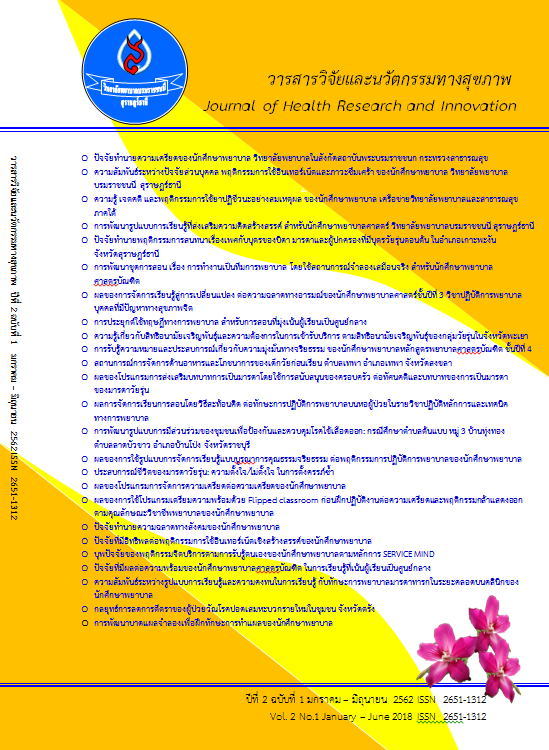การรับรู้ความหมายและประสบการณ์เกี่ยวกับความมุ่งมั่นทางจริยธรรม ของนักศึกษาพยาบาลหลักสูตรพยาบาลศาสตรบัณฑิต ชั้นปีที่ 4
คำสำคัญ:
ความมุ่งมั่นทางจริยธรรม, นักศึกษาพยาบาลบทคัดย่อ
การวิจัยนี้เป็นงานวิจัยเชิงคุณภาพมีวัตถุประสงค์เพื่อศึกษาการรับรู้ความหมายและประสบการณ์เกี่ยวกับความมุ่งมั่นทางจริยธรรมของนักศึกษาพยาบาลหลักสูตรพยาบาลศาสตรบัณฑิต ชั้นปีที่ 4 ผู้ให้ข้อมูลคือ นักศึกษาพยาบาลศาสตร์ชั้นปีที่ 4 ของวิทยาลัยพยาบาลสังกัดกระทรวงสาธารณสุข และคณะพยาบาลศาสตร์ของมหาวิทยาลัยแห่งหนึ่ง จำนวน 10 คน เก็บรวบรวมข้อมูลโดยการานทนากลุ่ม วิเคราะห์ข้อมูลเชิงคุณภาพโดยการวิเคราะห์เนื้อหา ผลการวิจัยสรุป ดังนี้
1. ความหมายของความมุ่งมั่นทางจริยธรรมเป็นไปใน 4 ลักษณะ คือ 1) การพยายามและตั้งใจทำ ในสิ่งที่ดีที่สุด 2) การมีเป้าหมายชัดเจนและพากเพียรจนสำเร็จ 3) การกล้าทำในสิ่งที่ถูกต้องโดยใคร่ครวญอย่างถี่ถ้วน และ 4) ปฏิบัติตามจรรยาบรรณวิชาชีพภายใต้คุณค่าที่ต่างกัน
2. ประสบการณ์เกี่ยวกับความมุ่งมั่นทางจริยธรรมเป็นไปใน 3 ลักษณะ คือ 1) ความมุ่งมั่นทางจริยธรรมต่อตนเอง 2) ความมุ่งมั่นทางจริยธรรมต่อผู้รับบริการ และ 3) ความมุ่งมั่นทางจริยธรรมต่อองค์กร ผลการศึกษาสามารถนำไปวางแผนการจัดการเรียนการสอนให้แก่นักศึกษาพยาบาลในหลักสูตรทุกชั้นปี เพื่อเป็นการเตรียมความพร้อมในการศึกษาภาคปฏิบัติที่จำเป็นจะต้องให้บริการทางด้านสุขภาพบนพื้นฐานของความมุ่งมั่นทางจริยธรรม และนำไปใช้เป็นแนวทางในการประเมินการรับรู้สถานการณ์ที่เป็นความมุ่งมั่นทางจริยธรรมต่อตนเอง ต่อผู้รับบริการ และต่อองค์กร เพื่อวางแผนการจัดการศึกษาและการพัฒนาคุณธรรมจริยธรรมที่สอดคล้องกับสถานการณ์ในปัจจุบันของประเทศต่อไป
เอกสารอ้างอิง
Atsawana, W., Sukwathanachaikul, D., Khawkham, P., & Jiarakongmun, P. (2013). The organization’s commitment: A case of personnel of department of radiology, faculty of medicine Ramathibodi Hospital, Mahidol University.
Basavanthappa, BT. (2011). Management of nursing services and education. Haryana: Rajkamal Electric.
Bastable, S. B. (2014). Nurses as educator: Principles of teaching and learning for nursing practice. (4th ed.). Burlington, MA: Jones & Bartlett.
Baxter, P. E., & Boblin, S. L. (2007). The Moral Development of Baccalaureate Nursing Students: Understanding Unethical Behavior in Classroom and Clinical Settings. Journal of Nursing Education, 46(1), 20-27.
Beauchamp, T. L., & Childress, J. F. (2013). Principle of biomedical ethics. (7th ed.). New York: Oxford University Press, Inc.
Braun, V., & Clarke, V. (2006). Using thematic analysis in psychology. Qualitative Research in Psychology, 3, 77-101.
Butts, J. B., & Rich, K. L. (2013). Nursing ethics: Across the curriculum and into practice. (3rd ed.). Burlington, MA: Jones and Bartlett.
Carpenter, D. R., & Hudacek, S. (1996). On doctoral education in nursing: The voice of the student. New York, NY: National League for Nursing Press.
Cullinan, C., Bline, D., Farrar, R., & Lowe, D. (2008). Organization-Harm vs. Organization-Gain Ethical Issues: An Exploratory Examination of the Effects of Organizational Commitment. Journal of Business Ethics, 80(2), 225-235.
Ebbeck, V., & Gibbons, S. L. (2003). Explaining the self-conception of perceived conduct using indicators of moral functioning in physical education. Research Quarterly for Exercise and Sport, 74(3), 284-291.
Etzioni, A. (1975). A comparative analysis of complex organizations. New York: Macmillan Publishing.
Fitzgerald, L. & Hooft, S. V. (2000). A Socratic dialogue on the question “what is love in nursing? Nursing Ethics, 7(6), 481-491.
Fry, S. T., & Johnstone, M. (2008). Ethics in nursing practice: A guide to ethical decision making. (3rd ed.). ICN: Blackwell Publishing Company.
Gastmans, C. (2013). Dignity-enhancing nursing care: A foundational ethical framework. Nursing Ethics, 20(2), 142-149.
Grace, P. J. (2014). Nursing ethics and professional responsibility in advanced practice. (2nd ed.). Burlington: Jones & Bartlett Learning.
Haahr, A., Norlyk, A., & Hall, E. O. C. (2014). Ethical challenges embedded in qualitative research interviews with close relatives. Nursing Ethics, 21(1), 6-15.
Hilli, Y., Salmu, M., & Jonsén, E. (2014). Perspectives on good preceptorship: A matter of ethics. Nursing Ethics, 21(5), 565-575.
Ion, R., Smith, K., Moir, J., & Nimmo, S. (2016). Accounting for actions and omission: A discourse analysis of student nurse accounts of responding to instances of poor care. Journal of Advanced Nursing, 72(5), 1054-1064. doi: 10.1111/jan.12893.
Kearney, M. H. (2001). Focus on the research methods: Levels and Applications of Qualitative research Evidence. Research in Nursing & Health. 24, 145-153.
Lyneham, J. & Levett-Jones, T. (2016). Insight into registered nurses’ professional value through the eyes of graduating students. Nurse Education in Practice, 17, 86-90.
Mansbach, A., Ziedenberg, H., & Bachner, Y. G. (2013). Nursing students’ willingness to blow the whistle. Nurse education today, 33, 69-72.
Marquis, B. L., & Huston, C. J. (2012). Leadership and management tools for the new nurse: A case study approach. Philadelphia, PA: Lippincott Williams & Wilkin.
Pochanakij, C. (2017). Development of Competency Indicators for Register Nurses of Songklanagarind Hospital. (Master of Nursing Science, Prince of Songkla University). (in Thai)
Raetong, P & Harnirattisai, T. (2012). Role Change Experience: From Nursing Students to Registered Nurses. Thai Journal of Nursing Council, 27(2), 51-62. (in Thai)
Rest, J. R. (1994). Background: Theory and Research. In J. R. Rest & D. Narvaez (Eds.), Moral development in the profession: Psychology and applied ethics (pp. 1-26). Hillsdale, N J: Lawrence Erlbaum Associates, Inc.
Sankaranarayanan, C., & Sindhu, B. (2012). Learning and teaching nursing. (4th ed.). New Delhi: Jaypee Brothers Medical Publishers.
Shafakhah, Z., Khademi, M., Molazem, Z., Sharif, F., (2018). Facilitators and inhibitors in developing professional values in nursing students. Nursing Ethics, 25(2), 153-164.
Sjöstedt, E., Dahlstrand, A., Severinsson, E., & Lützén, K. (2001). The First Nurse-Patient Encounter in a Psychiatric Setting: discovering a moral commitment in nursing. Nursing Ethics, 8(4), 313-327.
Tarkel, S. N. & Duval, R. S. (1999). Encyclopedia of Ethics. New York: Facts on File, Inc.
Vozzola, E. C. (2014). Moral development: Theory and applications. New York: Routledge.
Westrick, S. J. (2014). Essentials of nursing laws and ethics. (2nd ed.). Burlington, MA: Jones & Bartlett.
ดาวน์โหลด
เผยแพร่แล้ว
รูปแบบการอ้างอิง
ฉบับ
ประเภทบทความ
สัญญาอนุญาต
บทความที่ได้รับการตีพิมพ์เป็นลิขสิทธิ์ของวารสารวิทยาลัยพยาบาลบรมราชชนนี สุราษฎร์ธานี
ข้อความที่ปรากฏในบทความแต่ละเรื่องในวารสารวิชาการนี้เป็นความคิดเห็นส่วนตัวของผู้เขียนแต่ละท่านไม่เกี่ยวข้องกับวิทยาลัยพยาบาลบรมราชชนนี สุราษฎร์ธานี และคณาจารย์ท่านอื่นๆในวิทยาลัยฯ แต่อย่างใด ความรับผิดชอบองค์ประกอบทั้งหมดของบทความแต่ละเรื่องเป็นของผู้เขียนแต่ละท่าน หากมีความผิดพลาดใดๆ ผู้เขียนแต่ละท่านจะรับผิดชอบบทความของตนเองแต่ผู้เดียว



